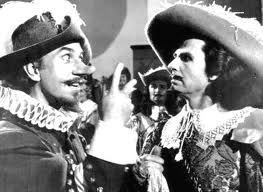Verbing Weirds Language
by Mel Gilden
Last week I wrote about watermelons — choosing a good one by observing a broom straw, and the strange people who don't like to eat them no matter how good they are. This got me thinking that there are all kinds of things besides watermelon that people like and don't like. For example, those of us in the word biz have personal preferences when it comes to grammar, spelling, punctuation, and word usage.
These items are not just the stuff of which we English majors are made. We get wound up in these things emotionally. Many of these English Major problems stem from mere laziness. Others are the result of ignorance. The problems don't bother me so much when spoken by someone who doesn't know any better, but professional word users should know better.
In his play Cyrano de Bergerac by Edmund Rostand one of the characters insults Cyrano by tell him, "Your nose is rather large." As lazy and ignorant as the fellow was, Cyrano merely laughs at him and insults himself using 50 or 60 very clever descriptions of someone with a large nose. " . . . when it bleeds the red sea." "Do you love the little birdies so that you give them this to sit on?" "What a sign for some perfumer!" I believe that some professionals today are as lazy and ignorant as the man who attempted to insult Cyrano by stating the obvious.

You might have said at least a hundred things...
Viz:
A popular sport these days is turning nouns into verbs. For a long time we've been hearing how something will impact — not have an impact — on something else. This is offensive particularly when you are discussing an impact in the physical sense, as in "The fist impacted his jaw." How about "struck"?
Facebook has made "friend" a verb, as in "I friended him." I supposed one could protest this is a professional usage, and I'm afraid I sometimes say it myself, but that doesn't mean I'm happy. As cranky as I am, even I sometimes find it difficult to swim against the tide.
A usage that bothers me even more, particularly when spoken or written by a professional broadcaster or writer is the whole "graduating" thing. Many of them who should know better say, "He graduated high school." What this actually means is he climbed up the building making marks along the way to show how tall it is. What the broadcaster really meant to say was, "He graduated from high school." The FROM is very important.
And then there's "not that much." Not how much? What, exactly is the speaker comparing something to? Perhaps he means "Not very much" or "Not as much as the other" or even "Not as much as we thought." "Not that much" doesn't actually mean anything.
Sometimes, by my lights a writer will make a whole basketful of errors. I tell people his prose style makes my teeth hurt. Of course, words don't really cause me physical pain, but the "teeth hurt" metaphor gives you an idea how I squirm and sweat when I read something that I consider to be really terrible.
Watch yourself when writing and speaking. Your prose will be more effective when you use the right word correctly.